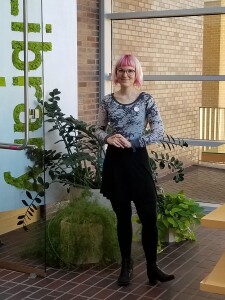
Callan Bignoli of #ProtectLibraryWorkers
The book world is rapidly changing in response to the COVID-19 pandemic. LibraryThing has been talking to people affected by these changes. For all our conversations, go here.
We interviewed Callan Bignoli (she/her/hers), Director of the Library at Olin College of Engineering, who has been organizing and advocating for the health of library workers. First through the #closethelibraries campaign to encourage hold-out library systems to close their physical doors for public and staff safety earlier this year, and now for #ProtectLibraryWorkers, advocating for a more considered approach to re-opening physical library locations, including curbside.
According to Callan, she “worked hardest on local efforts where she thought she’d be able to make the most change, and tried to supply resources to help people with organizing and power mapping to support them throughout the country.”
Callan be found on Twitter (@eminencefont) and her website.
1. What is #protectlibraryworkers and how did it come about?
#ProtectLibraryWorkers evolved from the #closethelibraries movement on Twitter when it became clear that just because a library had closed to the public did not mean that communities or library staff members were being kept safe. Curbside and home delivery, interlibrary loan, document scanning, and more were still happening at libraries, often with library assistants, pages, and student workers being put at risk while their “higher up” colleagues worked from home. In the case of libraries in Minnesota, Texas, Florida, and likely elsewhere, workers were forcibly deployed to other positions that exposed them to considerably more risk, such as emergency childcare centers and temporary shelters, with little choice in the matter other than whether or not to still get paid. Then, the wave of
layoffs and furloughs began to sweep the country. #ProtectLibraryWorkers was an attempt to speak out against all of these crises and advocate for libraries-as-people, not just libraries-as-institution as we have seen our professional organizations repeatedly choose to do.
2. How can people support library workers at their local or national level?
1) Sign
this petition written by members of current and past Library Freedom Institute cohorts to push for safe and fair reopening conditions. We want as many cosigners as we can get before we begin to distribute it to decision makers in individual states.
2) Figure out what is going on locally and question it. Is your local library providing curbside pickup before your state’s stay-at-home order is lifted? Ask why that’s happening and push for it to stop.
3) Continue paying attention to the local conversation and find like-minded fellow citizens to band together and prepare to push back on library budget cuts and staffing reduction.
3. If you could wave a magic wand and create guidelines for libraries as we go through reorienting to a new normal, what would some of those guidelines be?
Stay home for as long as possible. Don’t just close down and silo yourself off to the other departments in your school, city, or town; despite whatever competition for resources or beefs you had before, don’t feel as if you have to go this all alone. Everything is different now. Deeply and carefully consider which of your patrons are benefiting from curbside delivery, think about the amount of time and effort you’re putting into it, and think about what other outreach you might be doing to help those that aren’t benefiting. As layoffs and furloughs worsen, partner up to create mutual aid networks for library workers in your area. If you’re a director, do everything in your power to keep your staff. Communicate clearly and honestly with your people. Trust them to keep finding things to do while they’re teleworking, and ask yourself, “Does it really matter when we’re trying to save lives?” Ask that question often.
We ask all our interviewees the same final two questions:
4. How is your personal library organized?
At any given time, about 1/3 of my small collection of books are library checkouts (often from Olin’s library), so I have one shelf of those, one shelf of fiction, and one shelf of nonfiction. I tend to keep the unusual/unofficial things the longest, like self-published poetry books given to me by former patrons, a personal journal of the mid-century advertising artist
Marilyn Conover that I found in a used bookstore in Gloucester, the Shutterfly book my old boss gave me of the library we renovated together, that kind of stuff.
5. What have you read lately? What do you recommend?
I’m currently in the last section of Adrienne Maree Brown’s
Emergent Strategy which probably makes me seem like I’m behind the curve, but honestly when I was in public library administration, I didn’t read much of anything–so I’m still catching up now! I’d say the biggest takeaways for me personally have been 1) the understanding that movements can and should take many forms and that we shouldn’t necessarily lump things under the same big umbrellas, 2) the acknowledgment that lasting change is long, slow, and hard work, which isn’t something that naturally “comes” to me, and 3) the importance and strength of consensus decision making, and, relatedly, putting explicit trust in others. I’d recommend it to anyone doing work in social justice or advocacy movements, and really any kind of leaders or managers as well.
Labels: interview, Uncategorized






>>>”Deeply and carefully consider which of your patrons are benefiting from curbside delivery…”
What does that mean?